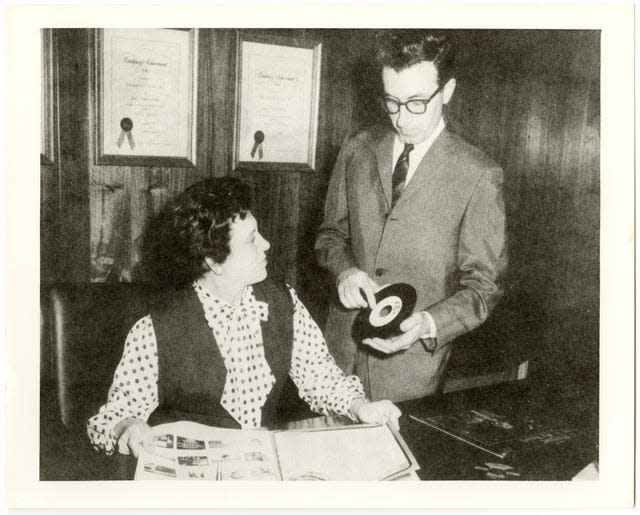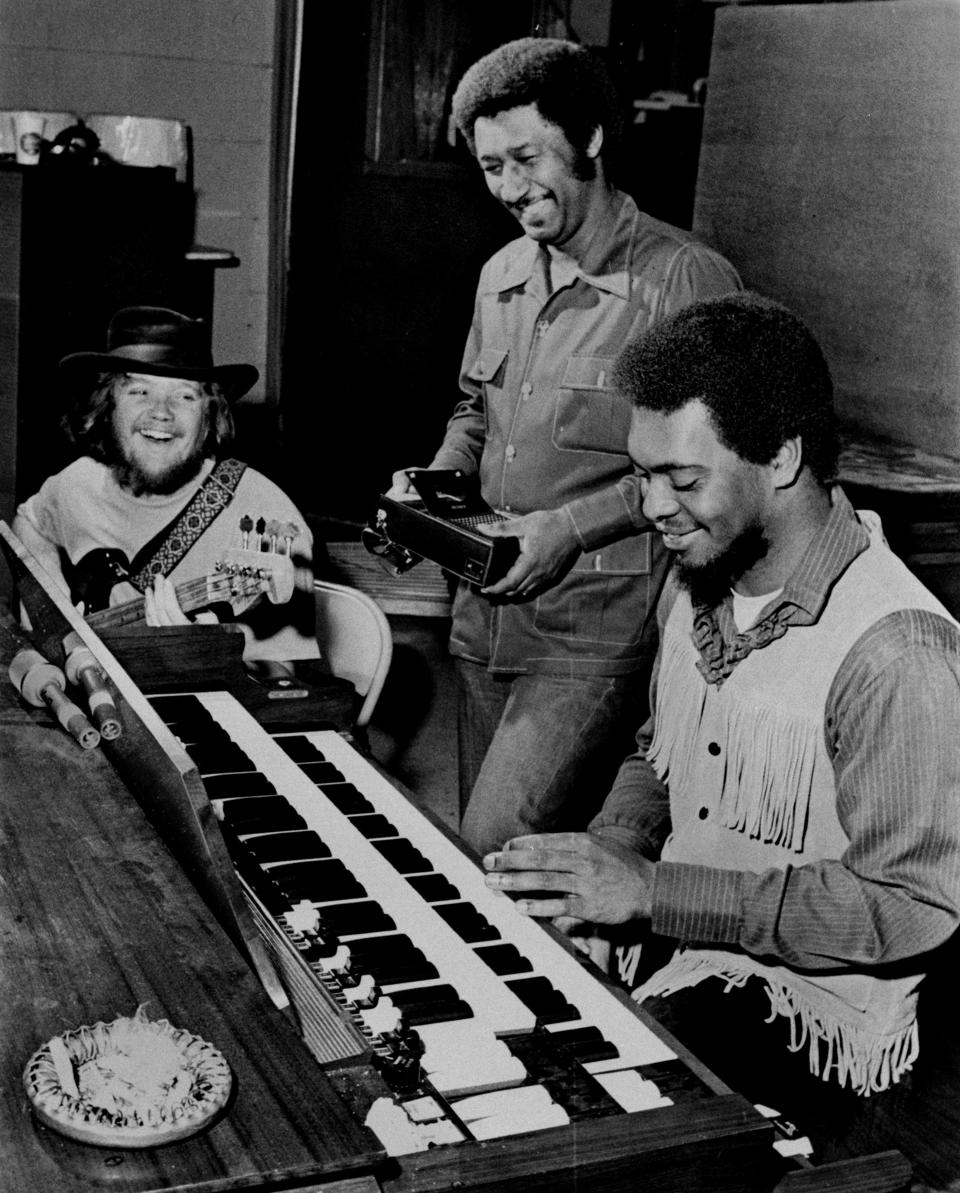From Carla Thomas to Isaac Hayes, HBO Stax documentary is story of 'Soulsville' — and America
- Oops!Something went wrong.Please try again later.
- Oops!Something went wrong.Please try again later.
- Oops!Something went wrong.Please try again later.
- Oops!Something went wrong.Please try again later.
- Oops!Something went wrong.Please try again later.
- Oops!Something went wrong.Please try again later.
"We as a Black people have made something fantastic."
Those words can be heard in "Ailey," a 2021 feature documentary directed by Brooklyn-based filmmaker Jamila Wignot. The speaker, in vintage interview footage, is Alvin Ailey himself, the pioneering African American dancer and choreographer. Ailey's chosen form of artistic expression, modern dance, is regarded as sophisticated and metropolitan, yet Ailey said his work was steeped in his childhood immersion in the blues and church traditions of the rural South.
"We as a Black people have made something fantastic" is a declaration that recurs, in various forms and in different words, throughout Wignot's latest work, "STAX: Soulsville U.S.A.," a documentary celebration/postmortem that premieres in four parts on Monday and Tuesday nights on HBO/Max.

Also emerging from the soil of the rural South (Stax's white founder, Jim Stewart, calls himself "a hillbilly from Tennessee"), the Memphis soul label has a deserved reputation as a place where Black and white artists collaborated on writing, performing and recording some of the greatest popular music of the past century. In the words of the white guitarist Steve Cropper, who is one of many Stax veterans interviewed for the series: "At Stax, there was no color."
Yet the documentary asserts that Stax's identity ultimately was "too Black" (to quote former company co-owner Al Bell) to save the studio from the wrecking ball after the white establishment — in Memphis and at CBS Records, in New York — became hostile to the company's increasing independence and success. "I'm proud to represent the city of Memphis, black and white," said Isaac Hayes, in a press conference, when he returned home after winning the Best Original Song Oscar for Shaft. "And we should take it upon ourselves to be the model city which we say were are." Instead, the documentary suggests, Stax was betrayed, disrespected — shafted.
In Wignot's telling, this rise-and-fall is not just the story of Stax or a story of Memphis but a story of America: a broken promise — a hand held out, then withdrawn (see also: Emancipation followed by Reconstruction). Stax branded itself as "Soulsville, U.S.A.," but in the context of the documentary, the phrase is more than just a snappy (or finger-snappy) slogan. "U.S.A." becomes a different type of brand — a claim of ownership.
This grim message takes nothing away from the beautiful sounds produced at 926 E. McLemore — what Al Bell calls the "great authentic music art" of "creative and rare people," many of whom wandered into Stax from the surrounding neighborhood after Stewart converted an old movie theater into a studio in 1960, and his sister and company investor, Estelle Axton, opened an adjacent record shop (where Cropper worked as a clerk before venturing into the studio).
DIRECTOR TALKS NEW STAX DOCUMENTARY: HBO's 'STAX: Soulsville U.S.A.' recounts triumph, tragedy of legendary Memphis soul label
Expertly and incisively constructed, the documentary is frequently joyful and exuberant, thanks to its liberal use of vintage performance footage, from-the-vaults recordings and archival photographs showcasing such talents as Rufus and Carla Thomas, Sam and Dave, Otis Redding, Isaac Hayes and Johnnie Taylor. "I just walked right into my dream," remembers Booker T. Jones, future leader of Stax hitmakers Booker T. & the MG's, who was pulled from algebra class by his friend, future songwriter David Porter, to play baritone saxophone on Stax's first hit soul single. "There I was, playing on a record. My dream came true when I was 14 years old."
Working with a mix of Memphis and out-of-town crew, Wignot augments the old material with many new interviews with Stax veterans, notably the uncompromising Jones; the charming Carla Thomas; irrepressible Bettye Crutcher; ace songsmith David Porter; and recent Grammy-winner Deanie Parker, the former Stax publicity director who is not just a key founder of the must-visit Stax Museum of American Soul Music — the phoenix that was resurrected from the rubble of the razed original building — but, arguably, the embodiment of the Stax spirit — the conscience that wouldn't let Memphis forget that the death of Stax in 1975 was a stain on the city if not a literal crime.
Says Parker: "Those with the power, they wanted Stax Records to be erased." Jones, meanwhile, tells Wignot that the assassination of Dr. Martin Luther King Jr. in Memphis in 1968 exposed the fact that "something was amiss" within the seeming utopia of Stax, however hopeful the symbolism of its revered interracial house band, Booker T. & the MG's.
"The relationship that we had in the studio didn't happen outside the studio," Jones says, adding that the belief that mainstream society's embrace of Black-led music meant that racism was diminishing "was not the truth."

STAX STARS ON STAGE: Memphis music stage at RiverBeat Music Festival rocks with Stax and soul greats
The Stax story has been told many times before, in books and in films. Rob Bowman, author of "Soulsville, U.S.A. – The Story of Stax Records," was a key contributor to the new project, and appears frequently on camera; and Wignot borrows some footage from "Respect Yourself: The Stax Records Story," a 155-minute film directed by Morgan Neville and Memphis' Robert Gordon (also the author of a book on Stax history) that, until now, was the definitive documentary on the subject.
Wignot's film, which places Stax's triumphs and troubles within an encompassing story of greater Memphis (the 1968 sanitation strike, the assassination of King), may be especially valuable for those for whom the narrative and its many strands (the tragic Otis Redding/Bar-Kays plane crash, the jubilant Wattstax concert) are fresh. Which probably actually means "most people." Given HBO's reach, it's possible that millions of people for the first time will hear Carla Thomas croon "Gee Whiz," which is justification enough for any project.
'STAX: Soulsville U.S.A.'
The debut times and dates for the documentary series episodes on HBO are listed below. In addition, all four episodes become available on the Max streaming service on May 20.
"Chapter One: Cause I Love You": 8 p.m. Monday, May 20. Named for the father-and-daughter duet by Rufus and Carla Thomas that gave Memphis' new record company its first hit in 1960. Synopsis: "With humble beginnings in Memphis in the late 1950s, Stax Records quickly becomes one of the most influential record labels on the Black music scene, breaking out iconic artists including Sam & Dave, Booker T. & the MG’s, and Otis Redding. With growing popularity in the Black market, Stax executives and musicians were determined to transcend racial divides and bring their music into the American mainstream."
"Chapter Two: Soul Man": 9 p.m. Monday, May 20. Synopsis: "Stax Records finally breaks through to the white market, with their crossover hit 'Soul Man' and Otis Redding’s performance at the Monterey Pop Festival. But Redding’s untimely death, the assassination of Dr. Martin Luther King Jr., legal obstacles, and ongoing racial tensions in Memphis reveal cracks in the surface at the company."
"Chapter Three: Respect Yourself": 8 p.m. Tuesday, May 21. Synopsis: "After the tragic death of Otis Redding and the Atlantic Records merger that left Stax in the dust, Stax promotions director Al Bell steps up to save the company, releasing hit records such as 'Soul Limbo' and 'Who’s Making Love?' Stax puts their efforts behind Isaac Hayes, who receives Grammy and Oscar awards for his work composing the music and theme song for the 1971 box office smash hit 'Shaft.'"
"Chapter Four: Nothing Takes the Place of You": 9 p.m. Tuesday, May 21. Synopsis: "By the 1970s, Stax is in its prime and decides to give back to the Black community in Los Angeles by putting on the Wattstax benefit concert in 1972 and recording the event as a documentary. However, not long after, money troubles plague the company when their bank goes under and drags Stax down with them, forcing the company to shutter its doors."
This article originally appeared on Memphis Commercial Appeal: HBO's new Stax documentary is story of Memphis — and America | Review

